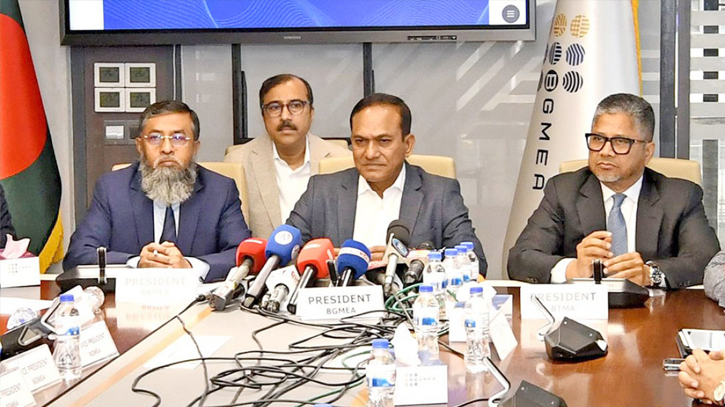
Photo: Collected
Leaders of Readymade Garment, Knitwear and Textile Owners Association BGMEA, BKMEA and BTMA have termed the proposed budget for the fiscal year 2024-2025 as disappointing. They made this comment at a joint press conference organized at BGMEA building in Dhaka's Uttara on Saturday.
It was said in the press conference that, “we expected the budget to have some policy support for the garment industry. In particular, we had high hopes to bring down the tax at source to 0.5 percent and treat it as a final tax”.
Besides, there were other expectations - exemption of income tax on incentives in the budget, VAT exemption of various goods and services required by industry, removal of complications related to HS code and weight, reduction of income tax on ERQ from 20 percent to 10 percent, tax on imports for replacement of fire and safety equipment. There will be an announcement of withdrawal of concession, 7.5 percent VAT on garments industry and 15 percent VAT on supply of recycled fiber. But none of these came up in the budget, which is disappointing for us.
BGMEA president SM Mannan Kochi said, “increasing the duty from zero percent to 1 percent will discourage new investors. We have also demanded that another five years should be given for investment outside economic or industrial zones. If this opportunity is not given then it will be a big hindrance to investment. Employment will not be created and export earnings will not increase”.
In the press conference, business leaders said that although inflation has been highlighted as one of the main challenges several times in the speech, controlling inflation will be the biggest challenge in the next financial year, especially due to the decrease in foreign exchange reserves. However, although some policy support has been proposed for this major foreign exchange earning sector, our main proposals to tackle the current difficult situation have not been reflected in the proposed budget.
The BGMEA president said, “however, we welcome the helpful proposals for the textile and apparel industry, notably – 20 percent deposit of the amount claimed in case of VAT appeals. It has been reduced to 10 percent. Import facility of 17 different textile products at subsidized rates has been provided”.
There, it was said that a special allocation of Tk 100 crore has been given to encourage renewable energy. The import duty of two raw materials used in the production of polyester fiber (PSF) and pet chips (textile grade) has been reduced from 10 and 25 percent to one percent. These are undoubtedly helpful for the industry. However, there are several proposals made in the budget which we feel will not be helpful for investment and job creation.
Proposal to increase import duty on various types of construction materials from five percent to 10 percent; Increase import duty of capital parts and construction materials from zero percent to one percent by establishments located in economic zones; Proposal to increase VAT on energy efficient lamps from five percent to 15 percent; Proposal to set new bond license fee at Tk 1 lakh instead of Tk 50 thousand and license renewal fee at Tk 10 thousand instead of Tk 5 thousand per annum will hamper business.
Business leaders said that in the 11th month of the current financial year, the growth of garment exports has decreased dramatically. 17 percent decrease in May alone. We have increased wages by 56 percent, but the cost of our clothing has not increased. Rather, in the last 9 months, the prices of our main products have fallen by 8 to 18 percent. When the industry is in such a critical situation, it is most necessary to support the garment industry, which earns the bulk of the export earnings, and thereby control inflation by increasing reserves.
Messenger/Fameema








